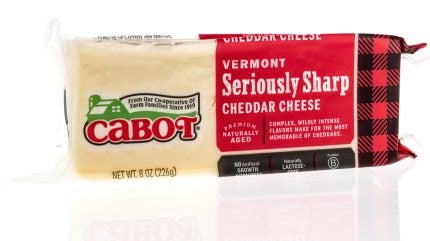
Agri-Mark alongside the Cabot Creamery Cooperative in the US has announced a significant move towards sustainability by transitioning to 30% post-consumer recycled (PCR) packaging for its 8oz cheese bars.
This change, which is set to take place later this year, follows a comprehensive sustainable packaging study initiated in 2022.
For the shelf-life and feasibility study, Cabot partnered with flexible packaging manufacturer TC Transcontinental Packaging.
The cooperative conducted the trial with three packaging options, including a 30% PCR content package, a structure ideal for industrial composters, and a fully recyclable flexible film.
The trial was designed to ensure that the new packaging maintained quality, flavour, appearance, and nutritional qualities.
The transition is expected to reduce greenhouse gas emissions and fuel requirements by up to 25%, along with considerable water savings during the manufacturing process.
Cabot plans to implement the transition to the PCR film gradually as the cooperative works through existing packaging supplies.
Agri-Mark/Cabot Creamery Cooperative CEO David Lynn said: “This is a pivotal moment in our journey to become a greener company, introducing one of the first cheeses in a post-consumer-recycled package.
“As the first dairy cooperative to achieve B-Corp status, we have a long-held commitment to sustainable practices and this shift to PCR packaging in our 8oz bar line represents a major milestone in that commitment.”
The sustainable packaging study was supported by a $323,875 grant from the Northeast Dairy Business Innovation Center (NE-DBIC).
Findings from the study will be shared across the industry to encourage broader adoption of sustainable practices.
NE-DBIC Regional Programs manager Kathryn Donovan said: “NE-DBIC is committed to the growth and modernisation of our region’s dairy sector, investing in research and development projects that have the potential to propel innovation at all scales.
“Through rigorous trials and their commitment to commercialising alternatives to virgin plastic, Cabot has demonstrated what is possible for the dairy industry to innovate in meaningful ways.”



